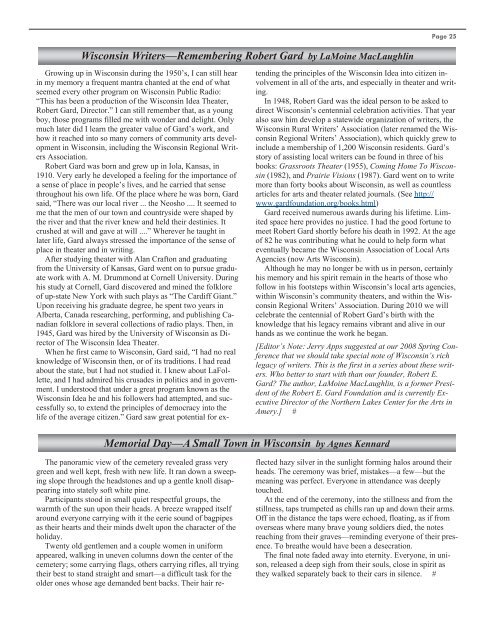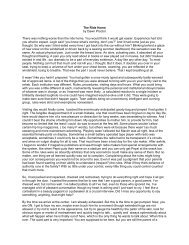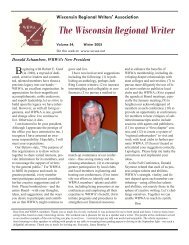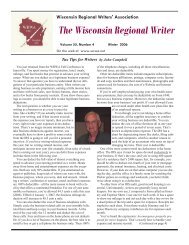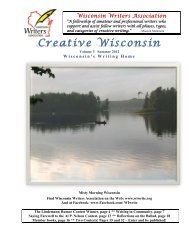Page 24More <strong>Writers</strong>’ Markets by Sylvia Bright-Greenhttp://www.birdersworld.com/brd/default.aspx?c=ss&id=38A bimonthly magazine for people with a broadinterest in wild birds and bird-watching. The readersown field guides and books on birds and readwidely. Features up to 2,250 words. "AttractingBirds" column 700-900 words. "Birding Briefs" are150-250 words.Pays $450 for most features.BELL BRIDGE BOOKShttp://www.bellebooks.com/bellbridge/Currently we are only looking for fantasy, darkfantasy, urban fantasy, and general Southern fiction.Please do not submit other genres. We'll letyou know when we expand.MUNDANIA PRESShttp://www.mundania.com/submissions.htmlMundania Press is open for unsolicited submissionsduring the months of March, April, September, andOctober each year. We Accept Novels, Novellas,and Short Stories in the following genres: Romance(Especially interested in Paranormal Romance),Science-Fiction, Fantasy, Horror, Mystery(Especially interested in Paranormal Romance), andYA (age 12 and up, must have science-fiction,fantasy, paranormal, or horror genre themes). Shortstories must be at least 5,000 words. Short storycollections may be submitted together under acommon title (an anthology). Previously publishedor self-published works are considered for republicationas long as the work is out of print everywhereand your publishing rights have been explicitlyreturned. We take both print and electronicrights.MIDNIGHT INKhttp://www.midnightinkbooks.com./Midnight Ink is a fresh new voice in mystery fictioncommitted to publishing suspenseful tales of alltypes: hard-boiled thrillers, cozies, historical mysteries,amateur sleuth novels, and more. It's alwaysmidnight somewhere.POSTCARD COLLECTORhttp://www.postcardcollector.com/Default.aspx?tabid=1064Postcard Collector brings informative articles on avariety of collecting interests of postcard collectors.It includes auction coverage, an extensive showcalendar, and a classified marketplace for paper andpostcard collecting enthusiasts. Postcard Collectoris packed with articles from experts who specializein all eras - from pioneer to modern and everythingin between. Pays up to $200 for up to 1,500 words.PETS MOBILITYhttp://www.petsmo.com/news/writersguide.asphttp://www.petsmo.com/news/News, features, reviews, health, travel, celebrities,working pets, technology. Stories should includeexperts and industry professionals. Features, however,can include narratives, investigative pieces,essays and memoirs. For pet lovers.GREEN PRINThttp://www.greenprints.com/wguidelines.htmlPays $200 for up to 2,000 words. We focus on thehuman, not how-to, side of gardening. On the peopleas well as the plants. After all, gardening is arelationship, not a recipe. GreenPrints explores thatrelationship, not by instructing, preaching, or lecturingabout it. Instead, we celebrate it by sharingthe stories and experiences we all have trying (andsometimes failing) to get along with plants.NEW JERSEY YOUTH MAGAZINE - EdwardsEducational Serviceshttp://www.journalismjobs.com/Job_Listing.cfm?JobID=926487A new quarterly New Jersey-based magazine targetinga demographic of urban young readers andtheir parents is accepting freelance writing submissions.The circulation is central Jersey: New Brunswick,Perth Amboy, and Trenton.The types of stories desired are personal experiencesin becoming successful in spite of difficulturban circumstances and how-to shepherd yourchildren into academic success in spite of somedifficult situations in urban environments. Articlesshould be written from expert interviews or interviewswith subjects on matters covered in the articles.Accepted and published submissions pay $.02a word. We are looking for submissions of between500 and 1,000 words. Please send queries to edwards.educationalservices@gmail.com.NEW MEXICO WOMANhttp://www.nmwoman.com/magazine/<strong>Writers</strong>Guidelines.pdfPays five cents/word. Interested in articles aboutprofessional and working women in New Mexico.Target readership is women between the ages of 25-65. Prefers articles that highlight the positives andsuccess of women in the community. Covers education,opportunities, career options, self improvement,women's health issues, and occasionallyarticles about home, hobby, travel, lifestyle, ornonprofit programs that serve women in the community.THE HEALING PROJECThttp://www.lachancepublishing.com/guidelines.htmlWe seek stories of your personal experience, or thatof family members, friends care givers or spouses."Voices Of"books feature true stories of literary merit and realemotional impact, stories that give insight, provideinspiration, courage and comfort to those in need.We also seek stories that might show a lighter sideof the challenge.Stories must be 500 to 2,000 words and pay $200.Similar to Chicken Soup series.LOVE STORIES MAGAZINE NEEDS POEMShttp://www.grassrootsmag.com/lostpo.htmlPlease allow up to 10-12 weeks for us to reviewyour poem.If your poem is accepted, pending originality verification,we will send you a release which states thatthis is your original work and it has never beenpublished before. We will buy global, electronicand Internet rights in all languages as well as futureanthology rights. You may not resell your storybefore it is published in Love Stories Magazine.After you sign the release we will issue a paymentof $50 US - $75 US to you ON PUBLICATIONalong with complementary copies of the magazine.ATLANTIC PUBLISHING SEEKS BOOK RE-VIEWERSE-mail: amiller@atlantic-pub.comhttp://www.atlantic-pub.com/ http://www.journalismjobs.com/Job_Listing.cfm?JobID=940262Atlantic Publishing Company is a leading publisherin the business, finance, real estate, and hospitalityareas. We are searching for freelance writers whoare interested in reading our books and writinghonest reviews of 1-3 paragraphs. We will pay $50for the entire project upon completion. ** If youhave done book reviews with us in the past we willnot be able to re-hire you at this time. We wouldlike writers who are interested and would like additionalinformation to e-mail Amanda Miller andprovide writing samples. We will provide youadditional info at that time.HOUSE & HOME MAGAZINEhttp://southjersey.craigslist.org/wri/wri/728728198.htmlhttp://housemagazine.com/index.phpHouse & Home magazine is seeking freelancewriters. Most work can be done via phone and e-mail, although some travel to local NJ locationsmay be required. Applicants should have an interestin writing about home renovations, interior designand household products. Rates are $250 to $300 forarticles ranging from 800 to 1,200 words. <strong>Writers</strong>must also request advertisers' photos and writecaptions.LES BONNES FEEShttp://www.les-bonnes-fees.com/guidelines.htmlLes Bonnes Fees is primarily a fairy tale magazineassuch, we are open to fiction submissions, as longas they relate to fairy tales in some way. Prose andnonfiction-- one to three cents/word up to 3,000words. Poetry-- fifty cents/line, up to 30 lines.VIBRANT LIFEhttp://www.vibrantlife.com/vl/writers.htmlVibrant Life is a bimonthly lifestyle magazine thatpromotes physical health, mental clarity, and spiritualbalance from a practical, Christian perspective.Information must be reliable--no faddism. Articlesshould represent the latest findings on the subject,and if scientific in nature, should be properly documented.Payment for articles ranges from $100 to$300.WOMEN'S ADVENTURE MAGAZINEhttp://www.womensadventuremagazine.com/magazine/guidelines.htmlProfiles, travel, general interest for women, health,first person narratives, food. Designed for womenwho participate in outdoor sports. Pays up to 50cents/word.GREAT WESTERN FICTIONhttp://www.greatwesternfiction.com/_mgxroot/page_10735.htmlOriginal, unpublished works of western fiction setin the American Old West before 1914. Short storiesand novels in the classic style for a generalreadership. No language. No sex. Word Length:Short stories from 3,000 to 10,000 words. Shortnovels over 40,000 words. Long novels over 90,000words. Payment: $50 for a short story. $250 for ashort novel. $500 for a long novel. #
Page 25<strong>Wisconsin</strong> <strong>Writers</strong>—Remembering Robert Gard by LaMoine MacLaughlinGrowing up in <strong>Wisconsin</strong> during the 1950’s, I can still hearin my memory a frequent mantra chanted at the end of whatseemed every other program on <strong>Wisconsin</strong> Public Radio:“This has been a production of the <strong>Wisconsin</strong> Idea Theater,Robert Gard, Director.” I can still remember that, as a youngboy, those programs filled me with wonder and delight. Onlymuch later did I learn the greater value of Gard’s work, andhow it reached into so many corners of community arts developmentin <strong>Wisconsin</strong>, including the <strong>Wisconsin</strong> Regional <strong>Writers</strong><strong>Association</strong>.Robert Gard was born and grew up in Iola, Kansas, in1910. Very early he developed a feeling for the importance ofa sense of place in people’s lives, and he carried that sensethroughout his own life. Of the place where he was born, Gardsaid, “There was our local river ... the Neosho .... It seemed tome that the men of our town and countryside were shaped bythe river and that the river knew and held their destinies. Itcrushed at will and gave at will ....” Wherever he taught inlater life, Gard always stressed the importance of the sense ofplace in theater and in writing.After studying theater with Alan Crafton and graduatingfrom the University of Kansas, Gard went on to pursue graduatework with A. M. Drummond at Cornell University. Duringhis study at Cornell, Gard discovered and mined the folkloreof up-state New York with such plays as “The Cardiff Giant.”Upon receiving his graduate degree, he spent two years inAlberta, Canada researching, performing, and publishing Canadianfolklore in several collections of radio plays. Then, in1945, Gard was hired by the University of <strong>Wisconsin</strong> as Directorof The <strong>Wisconsin</strong> Idea Theater.When he first came to <strong>Wisconsin</strong>, Gard said, “I had no realknowledge of <strong>Wisconsin</strong> then, or of its traditions. I had readabout the state, but I had not studied it. I knew about LaFollette,and I had admired his crusades in politics and in government.I understood that under a great program known as the<strong>Wisconsin</strong> Idea he and his followers had attempted, and successfullyso, to extend the principles of democracy into thelife of the average citizen.” Gard saw great potential for ex-tending the principles of the <strong>Wisconsin</strong> Idea into citizen involvementin all of the arts, and especially in theater and writing.In 1948, Robert Gard was the ideal person to be asked todirect <strong>Wisconsin</strong>’s centennial celebration activities. That yearalso saw him develop a statewide organization of writers, the<strong>Wisconsin</strong> Rural <strong>Writers</strong>’ <strong>Association</strong> (later renamed the <strong>Wisconsin</strong>Regional <strong>Writers</strong>’ <strong>Association</strong>), which quickly grew toinclude a membership of 1,200 <strong>Wisconsin</strong> residents. Gard’sstory of assisting local writers can be found in three of hisbooks: Grassroots Theater (1955), Coming Home To <strong>Wisconsin</strong>(1982), and Prairie Visions (1987). Gard went on to writemore than forty books about <strong>Wisconsin</strong>, as well as countlessarticles for arts and theater related journals. (See http://www.gardfoundation.org/books.html)Gard received numerous awards during his lifetime. Limitedspace here provides no justice. I had the good fortune tomeet Robert Gard shortly before his death in 1992. At the ageof 82 he was contributing what he could to help form whateventually became the <strong>Wisconsin</strong> <strong>Association</strong> of Local ArtsAgencies (now Arts <strong>Wisconsin</strong>).Although he may no longer be with us in person, certainlyhis memory and his spirit remain in the hearts of those whofollow in his footsteps within <strong>Wisconsin</strong>’s local arts agencies,within <strong>Wisconsin</strong>’s community theaters, and within the <strong>Wisconsin</strong>Regional <strong>Writers</strong>’ <strong>Association</strong>. During 2010 we willcelebrate the centennial of Robert Gard’s birth with theknowledge that his legacy remains vibrant and alive in ourhands as we continue the work he began.[Editor’s Note: Jerry Apps suggested at our 2008 <strong>Spring</strong> Conferencethat we should take special note of <strong>Wisconsin</strong>’s richlegacy of writers. This is the first in a series about these writers.Who better to start with than our founder, Robert E.Gard? The author, LaMoine MacLaughlin, is a former Presidentof the Robert E. Gard Foundation and is currently ExecutiveDirector of the Northern Lakes Center for the Arts inAmery.] #Memorial Day—A Small Town in <strong>Wisconsin</strong> by Agnes KennardThe panoramic view of the cemetery revealed grass verygreen and well kept, fresh with new life. It ran down a sweepingslope through the headstones and up a gentle knoll disappearinginto stately soft white pine.Participants stood in small quiet respectful groups, thewarmth of the sun upon their heads. A breeze wrapped itselfaround everyone carrying with it the eerie sound of bagpipesas their hearts and their minds dwelt upon the character of theholiday.Twenty old gentlemen and a couple women in uniformappeared, walking in uneven columns down the center of thecemetery; some carrying flags, others carrying rifles, all tryingtheir best to stand straight and smart—a difficult task for theolder ones whose age demanded bent backs. Their hair re-flected hazy silver in the sunlight forming halos around theirheads. The ceremony was brief, mistakes—a few—but themeaning was perfect. Everyone in attendance was deeplytouched.At the end of the ceremony, into the stillness and from thestillness, taps trumpeted as chills ran up and down their arms.Off in the distance the taps were echoed, floating, as if fromoverseas where many brave young soldiers died, the notesreaching from their graves—reminding everyone of their presence.To breathe would have been a desecration.The final note faded away into eternity. Everyone, in unison,released a deep sigh from their souls, close in spirit asthey walked separately back to their cars in silence. #


